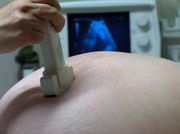
Are there any health risks for the fetus that may affect health care providers' stance on whether or not routine ultrasounds are needed? Some women have routine ultrasounds throughout pregnancy. There is no exact number of necessary ultrasounds required; it all depends on the specific health care provider and health of the individual pregnancy of each woman. So why do some providers discourage regular ultrasound use?
An ultrasound is a test that allows a picture/image of your unborn baby to appear on a screen for observation. They are oftentimes performed at specific weeks throughout a woman’s pregnancy to monitor the fetus for expected development and possible birth defects or complications. The American Pregnancy Association states that prenatal ultrasounds should only be performed when medically necessary or indicated.
Some providers schedule early ultrasounds to confirm pregnancy, and to make sure the embryo is attached inside the uterus (if the egg implants outside of the uterus it is considered an ectopic pregnancy). Many providers schedule ultrasounds between 16-20 weeks for developmental growth of the fetus; this is also the time when gender may be observed. If a complication occurs or is suspected, additional ultrasounds may be ordered. Because ultrasounds are deemed for medically necessary circumstances, a healthy pregnancy may never require an ultrasound.
What about the risks? Why would somebody prefer not to have ultrasounds performed? A fetal ultrasound works by two actions: heat and vibrations. Dr. Jacques Abramowicz, OBGYN from Rush University Medical Center explained, “There are two major effects of ultrasounds. One is to raise the temperature of the tissue it goes through, and two is to cause vibration because it is a sound wave with positive and negative pressures. The effect that is more important to the fetus is the heating effect.” A study performed in 2002 (see citation below) shows that increasing temperatures might have an affect on the fetus’ central nervous system. Abramowicz continued to explain how experienced ultrasound technicians or physicians are able to control the amount of energy/heat of the ultrasound through the controls of the machine, and the importance of having a skilled, knowledgeable technician performing your ultrasound. To ease your minds, testing has been happening for many years and no harmful effects to an unborn baby have been reported to date from ultrasound usage.
Different types of ultrasounds exist and are used depending on stage of pregnancy or whether or not certain risk factors are present. As mentioned earlier, they should only be used for medically necessary purposes and performed by trained professionals.
Research study reference:
Miller, M.W., et al. 2002. Hyperthermic teratogenicity, thermal dose and diagnostic ultrasound during pregnancy: implications of new standards on tissue heating. Int J Hyperthermia 18(5): 361–84.
More information about prenatal ultrasound use can be found at:
The American Pregnancy Association, http://www.americanpregnancy.org/prenataltesting/ultrasound.html.
The interview of Dr. Jacques Abramowicz, OBGYN was retrieved from http://familydoctor.org/online/famdocen/home/women/pregnancy/fetal/964.html.
Claire is a twenty-three year old nursing student at Arizona State University interested in perinatal nursing. She currently lives in Tempe, AZ with her dog Bella.






Add a Comment1 Comments
Nice piece of Info!
December 11, 2013 - 2:34amHelpful! :)
This Comment